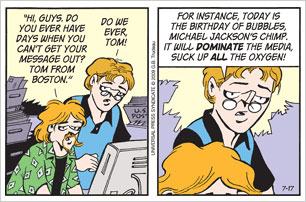
What a WasteThe Sotomayor hearings were a mass of missed opportunities for Republicans and Democrats alike.
Posted Wednesday, July 15, 2009, at 6:54 PM ETSee Slate's complete coverage of Sonia Sotomayor.
 This could have been different, I kept thinking all day. These hearings didn't have to go this way. The instant Sen. Jeff Sessions used his second round of questioning to go back to the well of the "Wise Latina" issue, probing yet again at Sonia Sotomayor's alleged bias and wise Latina prejudice, it was perfectly clear that Senate Republicans wanted this hearing to be all about race and that her single, mangled half-sentence was the linchpin of their strategy. There were lines of people waiting patiently to get into these hearings, even if just for a few moments, and what was striking about it is that so many of them were very young, so many were women, and so many were of different races and colors. America's future was waiting in line to get a glimpse of a hearing at which the woman who will become this country's first Hispanic justice was repeatedly called out as someone with a race problem.
This could have been different, I kept thinking all day. These hearings didn't have to go this way. The instant Sen. Jeff Sessions used his second round of questioning to go back to the well of the "Wise Latina" issue, probing yet again at Sonia Sotomayor's alleged bias and wise Latina prejudice, it was perfectly clear that Senate Republicans wanted this hearing to be all about race and that her single, mangled half-sentence was the linchpin of their strategy. There were lines of people waiting patiently to get into these hearings, even if just for a few moments, and what was striking about it is that so many of them were very young, so many were women, and so many were of different races and colors. America's future was waiting in line to get a glimpse of a hearing at which the woman who will become this country's first Hispanic justice was repeatedly called out as someone with a race problem.
I don't think this is all posturing. Listening to Jeff Sessions and Lindsey Graham and John Cornyn speak, it's clear that their anxieties about a changing America are real. Still, by making the whole case against her with a long, loopy line between her "wise Latina" speech and her panel decision in the Ricci case, they chose to turn this historic hearing into a crabbed and bitter conversation about the impact of race on America. Even though we might wish that she never gave her 2001 Berkeley speech, the speech reflects a deeper and more honest struggle with racial diversity than the one we have had here this week. Here is what she said in that speech:
America has a deeply confused image of itself that is in perpetual tension. We are a nation that takes pride in our ethnic diversity, recognizing its importance in shaping our society and in adding richness to its existence. Yet we simultaneously insist that we can and must function and live in a race- and color-blind way that ignores these very differences that in other contexts we laud. That tension between "the melting pot and the salad bowl"—a recently popular metaphor used to described New York's diversity—is being hotly debated today in national discussions about affirmative action. Many of us struggle with this tension and attempt to maintain and promote our cultural and ethnic identities in a society that is often ambivalent about how to deal with its differences.
It was the GOP's choice to turn this hearing from a conversation about diversity into a fight over race—pressing the firemen from Ricci and the judge's association with the Puerto Rican Legal Defense and Education Fund into evidence against her. Republicans didn't do that with gender over Ruth Bader Ginsburg's nomination. It didn't need to happen this way.
And it's not just Republicans who made a bad choice. Democrats, too, have failed to use this hearing to their advantage. With an opportunity to talk to all of America about their theory of jurisprudence and to make the case against the Roberts Court's narrow view of justice, they said almost nothing. Some of the only questioning along those lines came from Sen. Al Franken, who made Sotomayor very uncomfortable as he grilled her on the Roberts Court's tendency to overreach. In this term's Voting Rights Act case, the court came close to striking down an act of Congress, and in an age-discrimination case, it decided an issue that was never briefed. Franken politely asked Sotomayor, "How often have you decided a case on an argument or a question that the parties have not briefed?" He wondered whether that constituted judicial activism.
Good question. Why was the junior senator from Minnesota—the one sworn in only a week ago—the first one asking it?
And it wasn't just that Senate Democrats were confused among themselves about whether to embrace John Roberts' umpire analogy. Some of them have now clearly appropriated it, and others laid out vaguely articulated theories about the need for judges to do more than mechanically apply the law—whether it's hearing both sides of the story, or being particularly sensitive to some classes of plaintiffs. But even if you accept that there is nothing to be learned from the nominees themselves at these hearings, Democrats should understand that there is still much that can be taught. I learned more about liberal theories of jurisprudence from the Democrats' opposition to Roberts and Alito than I could glean from their support of Sotomayor. Sure, I get that Democrats like women and the environment and privacy. That comes up a lot in today's questioning. But that's not a judicial ideology. Nor is just calling balls and strikes—but that is the only theory we seem to have left in America.
 How Come the Brits Have Better Streaming Music Than We Do?
How Come the Brits Have Better Streaming Music Than We Do? Lithwick: What We Learned From the Sotomayor Hearings
Lithwick: What We Learned From the Sotomayor Hearings Would You Hire This Wide Receiver To Redecorate Your Home?
Would You Hire This Wide Receiver To Redecorate Your Home? Zooey Deschanel Would Be America's Sweetheart if America Had Any Taste
Zooey Deschanel Would Be America's Sweetheart if America Had Any Taste NYT Food Critic Frank Bruni Used To Be Chubby. But Was He Dangerously Fat?
NYT Food Critic Frank Bruni Used To Be Chubby. But Was He Dangerously Fat? The Week's Best Editorial Cartoons
The Week's Best Editorial Cartoons











In his confirmation hearing, Robert Bork said that the reason he wanted to be on the Supreme Court was to participate in the "intellectual feast" that judging on that Court provides.
Empathy, at least as I understand it, is the opposite of that.
It is the need to recognize that judgments involve real people. It is not an intellectual exercise or a debate. Does this mean that realizing that people are involved dictates a particular decision? Of course not. It does mean that seeing things only in disinterested abstractions, as supposedly is done by an umpire, is just not good enough.
-- alanhpolonsky
(To reply, click here)
The Dems also dealt with criminal defense issues (Sen. Durbin was most passionate; Klobuchar saw things a bit from the prosecution side too), campaign finance (Feingold, obviously), executive power (Feingold, Specter, etc.), congressional power (Specter), business issues (one or two of the lesser known Dems asked important if somewhat arcane questions here), voting rights, searches/seizures and even net neutrality (Franken, starting off a bit roughly). Most had at least somewhat of a lib slant. A constitutional vision was suggested.
The senators also provided an answer to the 'balls and strikes' simplicity. As Specter noted, the concern for "empathy" or use of her experience was much ado about nothing really since it is not really controversial that such things in some fashion affect judging (Specter listed a stream of justices who raised comments of this nature during their hearings). Whitehouse and Franken (the former in his intro -- Whitehouse was elsewhere talking about health care, so his focus might have been split) challenged the stereotypes about 'balls and strikes' and 'activism.' They put forth a more complex view of how the law works. Some also challenged the Roberts Court overall, including cases they didn't decide, the partial birth abortion case, etc.
I agree that the senators could have done a better job here. They had a limited focus in various ways, maybe a reflection on the nominee herself -- a safe somewhat mechanical jurist, whose more interesting comments are deemed not vanilla enough to risk really dwelling upon.
-- Joe_JP
(To reply, click here)